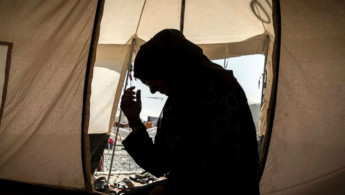Amnesty: Women and children linked to IS suffer abuse in Iraq
Iraqi women and children with suspected links to the Islamic State group are being denied humanitarian aid and prevented from returning to their homes, and the women are subjected to sexual violence in displacement camps, Amnesty International said on Tuesday.
The London-based rights group said its latest report is based on 92 interviews with women in eight camps for displaced Iraqis in the provinces of Nineveh and Salaheddin, north of Baghdad.
It said the report details the predicament of thousands of families left to fend for themselves after male relatives were killed, arbitrarily arrested or forcibly disappeared while fleeing IS-held areas in and around the northern city of Mosul.
"Women were being coerced and pressured into entering sexual relationships in exchange for desperately needed cash, humanitarian aid and protection from other men," it said, adding that women faced sexual exploitation in all eight camps.
Amnesty said the women also faced the risk of rape. Four women told the group they had either witnessed rape or heard the screams of women who were being assaulted by armed men, members of the camp administration or other camp residents.
"Women and children with perceived ties to IS are being punished for crimes they did not commit," wrote Lynn Maalouf, Amnesty's head of Middle East research. "This humiliating collective punishment risks laying the foundation for future violence."
Officials from Iraq's government could not immediately be reached for comment. But in the past, the government has vowed to punish anyone found to have committed abuses.
Iraq declared victory over IS late last year after a grueling three-year campaign against the extremists. The battle displaced hundreds of thousands of Iraqis, mainly Sunnis, and devastated Sunni-majority towns and cities.
Amnesty called on the government to show that it was "serious" about ending the violations against women by holding all perpetrators to account and keeping armed men out of the camps. It said that in some cases, families with perceived ties to IS faced problems when they returned home.
"In several areas, local and tribal authorities have issued orders that block the return of women and children with perceived ties to IS," it said. "Those who have made it home have faced evictions, forced displacement, looting, threats and abuse, including sexual abuse and sexual harassment."
In some instances, it said, their homes have been destroyed or had their power and water cut off.
"To put an end to the poisonous cycle of marginalization and communal violence that has plagued Iraq for decades, the Iraqi government and international community must commit to upholding the rights of all Iraqis without discrimination," Maalouf wrote.
"Without this, there can be no national reconciliation or lasting peace."





 Follow the Middle East's top stories in English at The New Arab on Google News
Follow the Middle East's top stories in English at The New Arab on Google News
![Israeli forces ordered bombed Gaza's Jabalia, ordering residents to leave [Getty]](/sites/default/files/styles/image_330x185/public/2176418030.jpeg?h=a5f2f23a&itok=_YGZaP1z)

